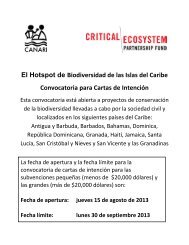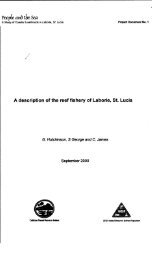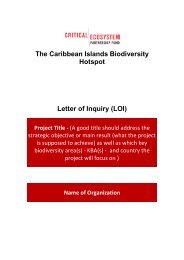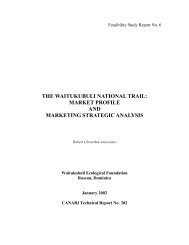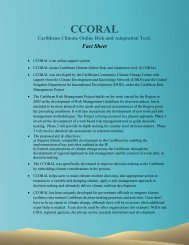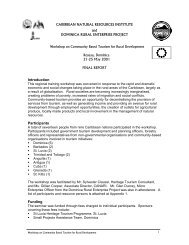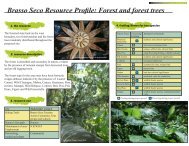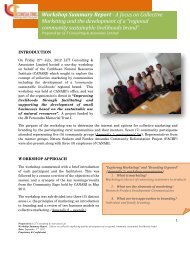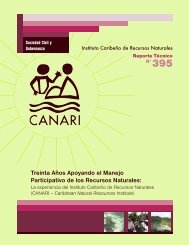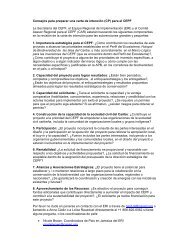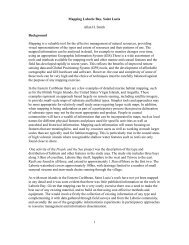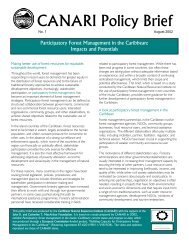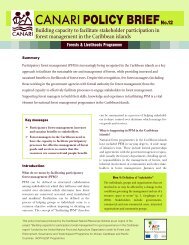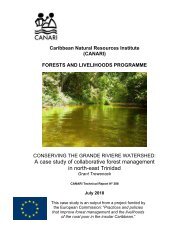Addressing Climate Change in the Caribbean: A Toolkit ... - CANARI
Addressing Climate Change in the Caribbean: A Toolkit ... - CANARI
Addressing Climate Change in the Caribbean: A Toolkit ... - CANARI
Create successful ePaper yourself
Turn your PDF publications into a flip-book with our unique Google optimized e-Paper software.
Introduction<br />
Why focus on climate change<br />
<strong>Climate</strong> change is already a part of our reality here <strong>in</strong> <strong>the</strong> <strong>Caribbean</strong>. It is not a future threat.<br />
Scientists have evidence that <strong>the</strong> <strong>Caribbean</strong> is gett<strong>in</strong>g warmer, hurricane seasons are becom<strong>in</strong>g<br />
more active and storms more <strong>in</strong>tense, and ra<strong>in</strong>fall patterns are shift<strong>in</strong>g. All <strong>the</strong>se changes are l<strong>in</strong>ked<br />
to climate change. <strong>Climate</strong> change is as much a challenge to our communities, livelihoods and<br />
overall wellbe<strong>in</strong>g as unemployment, poverty, HIV/AIDS, or violence. It has been called a threat to<br />
development and a “threat multiplier” because of how it comb<strong>in</strong>es with o<strong>the</strong>r challenges and<br />
vulnerabilities to “make th<strong>in</strong>gs that are already a problem worse”. 1<br />
<strong>Climate</strong> <strong>in</strong>fluences <strong>the</strong> types of build<strong>in</strong>gs we construct, <strong>the</strong> houses we live <strong>in</strong> and <strong>the</strong> clo<strong>the</strong>s we<br />
wear. It shapes ecosystems (ecological systems) and helps determ<strong>in</strong>e types of plants and animals<br />
found <strong>in</strong> a particular location. <strong>Climate</strong> <strong>in</strong>fluences our culture, <strong>the</strong> types of th<strong>in</strong>gs we do for fun, and<br />
even our mood. 2 This means that changes <strong>in</strong> climate can affect how we live, <strong>the</strong> plants and animals<br />
around us, our health and well-be<strong>in</strong>g, and even how we earn our liv<strong>in</strong>gs. Human and biological<br />
systems are so closely connected that a change <strong>in</strong> one system has consequences or effects on <strong>the</strong><br />
o<strong>the</strong>r. Dramatic and long-term changes <strong>in</strong> climate have <strong>the</strong> potential to set back and even undo<br />
efforts to create susta<strong>in</strong>able ways of earn<strong>in</strong>g a liv<strong>in</strong>g, elim<strong>in</strong>ate poverty, protect <strong>the</strong> natural<br />
environment and improve people’s standard of liv<strong>in</strong>g.<br />
The <strong>Caribbean</strong> is on <strong>the</strong> frontl<strong>in</strong>e<br />
Small islands like those of <strong>the</strong> <strong>Caribbean</strong> produce less than 1% of <strong>the</strong> gases <strong>in</strong> <strong>the</strong> air that are<br />
responsible for climate change, yet <strong>the</strong>y are among <strong>the</strong> most vulnerable to its effects. Our islands are<br />
vulnerable to natural hazards because <strong>the</strong>y are so small and <strong>the</strong> land and sea environments are<br />
closely l<strong>in</strong>ked: whatever happens on one affects <strong>the</strong> o<strong>the</strong>r. <strong>Climate</strong> change is a big threat as many of<br />
its direct effects are environmental. And because most of our islands rely on <strong>in</strong>dustries that use <strong>the</strong><br />
environment, such as fisheries, tourism, and agriculture, anyth<strong>in</strong>g that damages our natural<br />
resources also affects our economies and livelihoods.<br />
We can no longer do bus<strong>in</strong>ess as usual<br />
We have to take climate change seriously and we have to understand what it means for us. <strong>Climate</strong><br />
change doesn’t mean we will experience new wea<strong>the</strong>r conditions, but it does mean that what we<br />
used to th<strong>in</strong>k of as unusual <strong>in</strong> terms of wea<strong>the</strong>r conditions is becom<strong>in</strong>g normal. Severe wea<strong>the</strong>r, like<br />
1<br />
Huq, S. and C. Pettengell. 2008. The impact of climate change on human security. The Bridge Magaz<strong>in</strong>e. Issue 1-10/2008<br />
2<br />
Hulme, M. 2006. <strong>Climate</strong> change: A statement of science. Tyndall Centre for <strong>Climate</strong> Research and School of Environmental Science, University of<br />
East Anglia.<br />
<strong>Climate</strong> <strong>Change</strong> Community <strong>Toolkit</strong>/Christian Aid (<strong>Caribbean</strong>) 1



